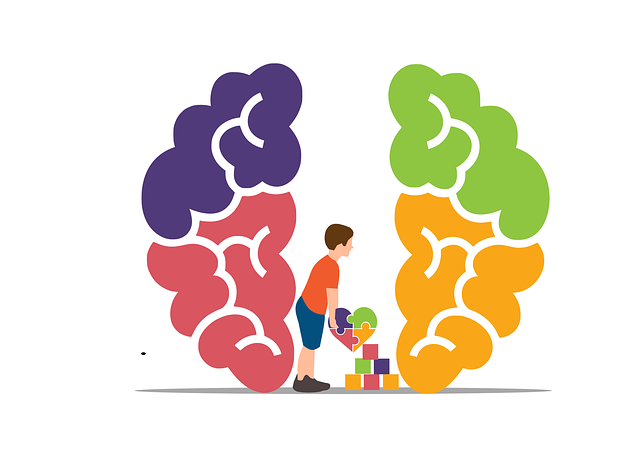Greenwood Village Major Life Transitions Therapy tackles the connection between life changes, mental health, and substance abuse. This unique approach recognizes that major events like graduating or bereavement can trigger emotional distress, increasing vulnerability to substances. Therapists use cultural sensitivity for tailored support, identify at-risk individuals early, and employ evidence-based strategies including mindfulness and cognitive-behavioral therapy. By fostering community connections through support groups and leveraging local resources, Greenwood Village Therapy promotes resilience, self-compassion, and long-term mental wellness in recovery.
In the journey towards a healthier life, understanding the intricate link between major life transitions and substance abuse is pivotal. This article explores strategies to navigate these changes safely, focusing on Greenwood Village Major Life Transitions Therapy as a beacon of hope. We delve into recognizing early signs of risk in substance use, evidence-based risk reduction tactics, and the power of support systems for long-term recovery. By harnessing these tools, individuals can embrace transformation and cultivate lasting well-being.
- Understanding the Connection Between Life Transitions and Substance Abuse
- Greenwood Village Major Life Transitions Therapy: An Overview
- Identifying Early Signs of Potential Risk in Substance Use
- Evidence-Based Strategies for Effective Risk Reduction
- Support Systems and Community Resources for Sustained Recovery
Understanding the Connection Between Life Transitions and Substance Abuse

Life transitions, whether positive or challenging, can significantly impact an individual’s mental health and, in some cases, increase vulnerability to substance abuse. This is particularly evident in Greenwood Village communities where major life events like moving to a new city, changing jobs, or experiencing the loss of a loved one can trigger emotional distress. Therapy focused on these specific transitions plays a crucial role in depression prevention and overall well-being promotion.
Understanding the intricate link between life transitions and substance abuse is essential for mental health professionals. Incorporating cultural sensitivity in mental healthcare practice ensures that therapists are equipped to address diverse client needs. Effective risk management planning involves identifying at-risk individuals, providing timely interventions, and offering tailored support. By recognizing these connections, Greenwood Village major life transitions therapy can offer much-needed guidance, helping clients navigate challenging periods while minimizing the potential for substance abuse as a coping mechanism.
Greenwood Village Major Life Transitions Therapy: An Overview

Greenwood Village Major Life Transitions Therapy offers a unique and comprehensive approach to addressing substance abuse issues, focusing on the profound impact that major life transitions can have on an individual’s mental health and vice versa. This therapeutic model recognizes that significant changes in one’s life, such as graduating from college, getting married, or experiencing the loss of a loved one, can trigger emotional distress and, in some cases, lead to substance abuse. By understanding these transitions and their effects, therapists in Greenwood Village provide a safe space for clients to explore and process their emotions.
The therapy focuses on empowering individuals to develop resilience through various emotional healing processes and compassion cultivation practices. It encourages clients to confront and overcome challenges associated with life changes, fostering a sense of stability and self-compassion. This holistic approach not only aids in substance abuse recovery but also equips individuals with valuable tools to navigate future transitions, promoting long-term well-being and mental health.
Identifying Early Signs of Potential Risk in Substance Use

Recognizing early signs of potential risk in substance use is a vital step in implementing effective risk reduction strategies. This process often involves careful observation and understanding of behavioral changes. As individuals navigate major life transitions, such as those experienced in Greenwood Village, their relationships with substances may evolve. Red flags can include sudden changes in mood, increased secrecy, or a decline in academic or work performance. It’s crucial to approach these signs with empathy building strategies, fostering open dialogues that encourage individuals to share their struggles without fear of judgment.
The role of compassion cultivation practices cannot be overstated in this context. By promoting understanding and reducing the mental illness stigma associated with substance abuse, communities in Greenwood Village can create a safer environment for early intervention. This supportive atmosphere encourages those at risk to seek help, knowing they will be met with compassion rather than condemnation. Such efforts contribute to successful therapy outcomes, allowing individuals to address underlying issues and make healthier choices throughout their major life transitions.
Evidence-Based Strategies for Effective Risk Reduction

Evidence-based strategies play a pivotal role in effectively reducing risks associated with substance abuse. One such approach is Greenwood Village Major Life Transitions Therapy, which focuses on guiding individuals through significant changes, helping them develop coping mechanisms and inner strength. This therapy has proven beneficial for those facing life transitions that may increase vulnerability to substance misuse. By addressing underlying emotional challenges and fostering mental wellness, it empowers clients to navigate stressors in healthier ways.
Additionally, incorporating practices like inner strength development can significantly bolster risk reduction. Therapists often integrate techniques from the Mental Wellness Podcast Series Production, such as mindfulness exercises and cognitive-behavioral therapy (CBT), to teach individuals how to manage anxiety relief and reduce the appeal of substance abuse. These evidence-based methods not only help in the short term but also equip individuals with lifelong tools to maintain mental health and avoid relapse.
Support Systems and Community Resources for Sustained Recovery

Building a strong support system is an integral part of sustained recovery from substance abuse. Greenwood Village Major Life Transitions Therapy emphasizes the importance of community resources and social connections in fostering long-term healing. Individuals in recovery benefit from being surrounded by like-minded individuals who understand the challenges they face, providing a sense of belonging and encouragement. Support groups, whether online or in-person, offer a safe space to share experiences, gain insights, and find accountability.
Community resources play a vital role in risk management planning for mental health professionals. These include access to counseling services, therapy sessions, and programs focused on self-esteem improvement and self-awareness exercises. By leveraging these tools, individuals can develop coping mechanisms, enhance their decision-making abilities, and build resilience against potential triggers. The overall goal is to create a supportive environment that encourages continuous growth and recovery.
Substance abuse often arises as a coping mechanism during life transitions, making Greenwood Village Major Life Transitions Therapy a vital resource. By understanding the connection between these events and addiction, we can implement effective risk reduction strategies. Early identification of potential risks, backed by evidence-based practices, plays a crucial role in prevention. Additionally, fostering strong support systems and utilizing community resources are key to sustaining recovery. Armed with this knowledge, individuals can navigate life’s challenges healthily, free from the grip of substance abuse.














